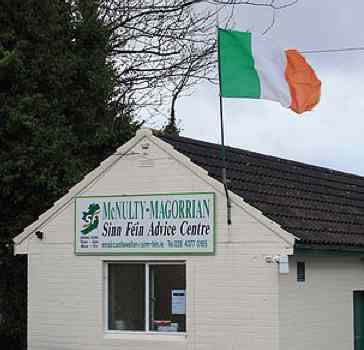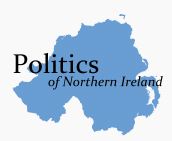
(Good Friday, April 10, 1998) The two-year-old peace talks in Northern Ireland finally produced a settlement this afternoon after an imposed deadline forced a 32-hour marathon debate among the parties.
Weary, but determined delegates from 2 countries and 8 different political factions signed off on the agreement which would, if ratified, establish self-rule for Northern Ireland, which had been under direct British control for 26 years. It would also create historic cooperation with the independent Republic of Ireland to the south.
British Prime Minister Tony Blair and Mr. Ahern had arrived to give a needed push to the talks, in near-collapse three days ago, and President Clinton telephoned at several key points, even at 3:30 in the morning, urging several of the participants toward a resolution.
The Protestant (unionist) majority won assurances that Northern Ireland would remain under British authority until a majority of voters consented otherwise. And they will enjoy a clear majority in the new 108-member council created for their self-governance.
The Catholic nationalists, who want to rejoin the Irish Republic, have been a minority burdened by prejudice. They would receive a declaration of equality and mutual respect and participation in both a new north/south “ministerial council” and newly-established cross-border discussions with the Republic that would involve a range of issues like transportation and tourism.
“There’s a symbolism about Easter, and every Irishman knows that,” said Seamus Mallon, deputy leader of the Social Democratic and Labor Party and a delegate at the talks. “The old Northern Ireland has died, and now, on Easter weekend, it is ready to rise again.”
Implementation of the agreement depends on a majority of Irish voters ratifying it on May 22,1998. The chances for passage are very good. (See below for May update)
_________________________________________________
(May 23, 1998) Citizens in both Northern Ireland and the Republic of Ireland voted yesterday in landslides to accept the Good Friday Peace Accord signed last month at the all-party talks. (see April story below)
71% of Northern Ireland’s voters agreed to the plan alongside an even bigger 94% majority in the south.
The plan calls for altering the Irish constitution’s territorial claim to the North, and establishes new government institutions within which the two sides can work toward the uniting goal of a lasting peace.
Sinn Fein, the political wing of the Irish Republican Army (IRA) won early parole for its imprisoned members. Its president, Gerry Adams, said that in many ways Northern Ireland citizens have been “ahead of the politicians and have taken a leap of faith to move the whole situation forward.. I think we have to deliver on that.”
It was widely seen as a vote against the violence of 30 years, which has killed and injured thousands, but it also feels like the joining of two opposing camps, hearts opened in an effort to explore their Christian credo of loving their enemies. (Photo by Ardfern, CC)





















[…] Northern Ireland peace talks ended victoriously on a religious holiday with the historic Good Friday Agreement, which ended 30 years of bloody conflict […]
[…] had been created one year earlier by a ceasefire between the IRA and Loyalists.Two years later, the Good Friday peace agreement would end decades of […]